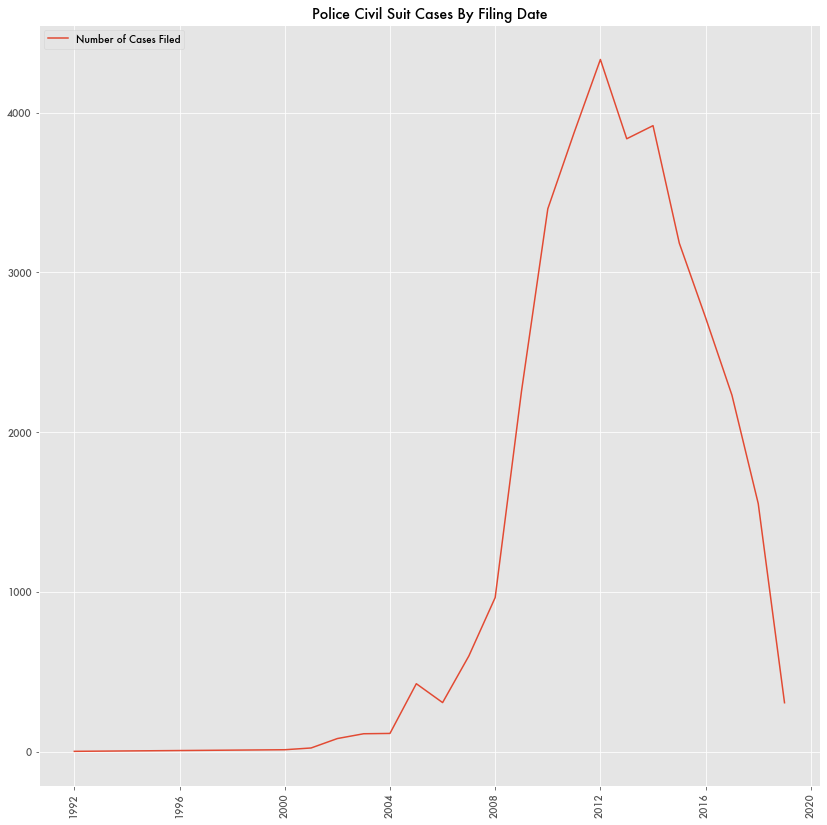Police Civil Suits Disappeared During Trump
In 2017, a record $447 million in police civil suits was awarded across the country. The huge payout comes from the growing number of cases filed since 2004.
Most of these cases revolve around accusations of excessive force by police departments, but also includes other categories like due process and false arrest according to data from Five Thirty Eight compiled from selected major cities. Those cases lead to multi-million dollar payouts that came out of the city's budget.
The flood of civil cases came to an abrupt halt as President Trump came into office. The number of cases filed went from a relative high of 3,183 in 2015 to 308 in 2019. The amounts awarded by the court or by settlement dropped by half between 2017 and 2019.
The data is not complete; numerous cases may not be included, some cases are missing information, and for others, the award amount may be overturned on appeal. Some data is based on a best interpretation by Five Thirty Eight.
Early on in the Trump administration, then attorney general Jeff Sessions released a memo rescinding consent decrees related to police misconduct—agreements between the Justice department and states that enabled the Justice department to investigate local police departments for federal crimes, like civil rights cases. That decision was recently revoked by Biden attorney general Merrick Garland shortly after the police officer in the George Floyd civil rights case in Minnesota, Derek Chauvin, was found guilty. Floyd's civil case represented the largest civil payout in history at $27 million.
Following the nullification of the Sessions memo, Garland announced the investigation of the Louisville, Kentucky police department.
Consent decrees sometimes require that cities publish settlement data as a show of transparency. For example, in 2019, the City of Chicago entered into a consent decree that required the city government to publish reports showing litigation costs.
Additionally, some states have looked into removing qualified immunity—a rule that protects police officers from fines when a civil case is brought against them and the police department. States like Colorado, Connecticut, and New Mexico have removed it in one way or another, but there are few civil cases in those states. The only city in the data from those three states is Waterbury, CT, and it only accounts for 15 cases and $2.2 million in damages—less than .1 percent of the total.
City by City
The data collected by Five Thirty Eight comes with many caveats and it may not be reliable for state-by-state comparisons. With that said, the cities that account for the most cases, in total and per capita, are the larger cities—New York, Chicago, Los Angeles, Detroit, Washington, DC. Smaller cities also show up near the top, like Springfield, MA, which had the highest payout per capita of any city, largely because of a single case that awarded $26,677,000 in damages. Even without that case, the city of around 154,000 ranked 10th overall. Other smaller cities also show up near the top, like Patterson, NJ, and North Charleston, SC.
New York City stands out in every way possible. It has the most cases (32,631), cases per capita (.004), awards ($1.7 billion), and awards per capita ($204).
Civil Rights Groups
While the cases dropped off during the Trump administration, funding for civil rights litigations has flourished. In January, an anonymous donor gave the NAACP's Legal Defense Fund $47 million for scholarships that focus on civil rights issues in the south. That same legal fund saw their annual revenue almost triple in 2017, going from $12,143,807 to $31,499,942, largely from contributions according to data from Charity Navigator.
The same flood of contributions occurred for the American Civil Liberties Union (ACLU), The Southern Poverty Law Center (SPLC), and the Equal Justice Initiative, only more so. The SPLC went from $51 million in contributions in 2016 to $133 million in 2017, and the ACLU went from $89 million to $140 million the same year.
Criminal Cases
While civil cases flourished from 2008 to 2016, few police officers are ever convicted in criminal trials, and few are even referred to a criminal trial. According to Syracuse University's Transactional Records Access Clearinghouse (TRAC), federal cases for “deprivation of rights under the color of law,” which is what excessive force is prosecuted as, averaged about 41 a year and hasn't changed dramatically over the same period as the thousands of civil cases.
Compare that to the over-4,000 civil cases filed in 2012 alone in the Five Thirty Eight data, which is incomplete and does not include all municipalities.







